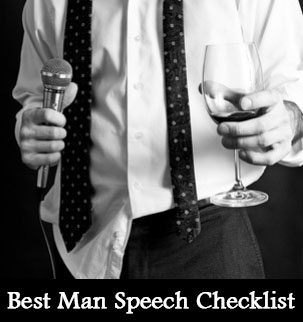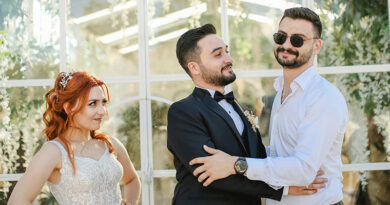Best Man Speech Checklist
Of all the traditional speeches at the wedding reception, the best man’s is the most anticipated. Guests look for humour from all the speeches, and are usually happy to reward even the feeblest attempt at a joke with gales of booming laughter. But the expectation has grown up that, whether or not any of the other speakers can stretch to a gag, the best man at least should do his best to put on a bit of a show and raise a few chuckles.
 Actually, this is not as daunting as it sounds. The best man usually speaks last, by which time guests tend to have relaxed considerably (a fact not unconnected with the wine that is disappearing at a rapid rate from the tables). By this time their sense of humour threshold will have lowered considerably, so anything that vaguely looks like a punch line should bring the house down.
Actually, this is not as daunting as it sounds. The best man usually speaks last, by which time guests tend to have relaxed considerably (a fact not unconnected with the wine that is disappearing at a rapid rate from the tables). By this time their sense of humour threshold will have lowered considerably, so anything that vaguely looks like a punch line should bring the house down.
Another advantage you’ll have at this point is familiarity. Usually – unless you’re posh enough to have a separate Master of Ceremonies – you the best man will have been acting as the host or anchorman of the whole occasion, so by the time you get up to say your piece guests will be used to your ways.
Your role, in fact, is a multiple one. As the groom’s best friend, it is your job to humiliate the Main Man in as amusing a fashion as possible. As host, you will read out telegrams and pass on any practical announcements – anything people need to know, for instance, about the evening’s activities. And as traditional head of the wedding assistants, you will also speak on behalf of the bridesmaids.
Best Man Speech Checklist
Points you may like to include:
The traditional best man’s beginning often involves thanking the bride and groom for their gifts and compliments to ‘the team’ of bridesmaids, ushers, page boys etc.
Read any telegrams and other messages from invited guests unable to attend the wedding.
Also near the start, you might want to tell some behind-the-scenes stories about preparing for the wedding – especially any amusing incidents, narrowly averted disasters etc.
Make a point of addressing the couple, and especially of talking to and about the bride too. Too many best man’s speeches almost entirely overlook her.
And so to the traditional main task – embarrassing the groom. Your material should be funny without being nasty, risqué without being offensive. Props are often used here, and stories – or hints at stories – from the stag night often crop up too.
It can seem like a good idea to mention past relationships, but tread carefully. The golden rule: If there’s a chance it might upset the bride… leave it out.
Leaven the mockery with some sincerity. Talk about how you met the groom, how you came to be best mates, how much you really think of him, your perspective on the growing relationship between bride and groom, how he behaved differently with her (the moment I knew it was serious…), your best wishes for their future together etc.
If you have any messages to read, include them after your main speech.
Conclude with a toast to the bride and groom.

